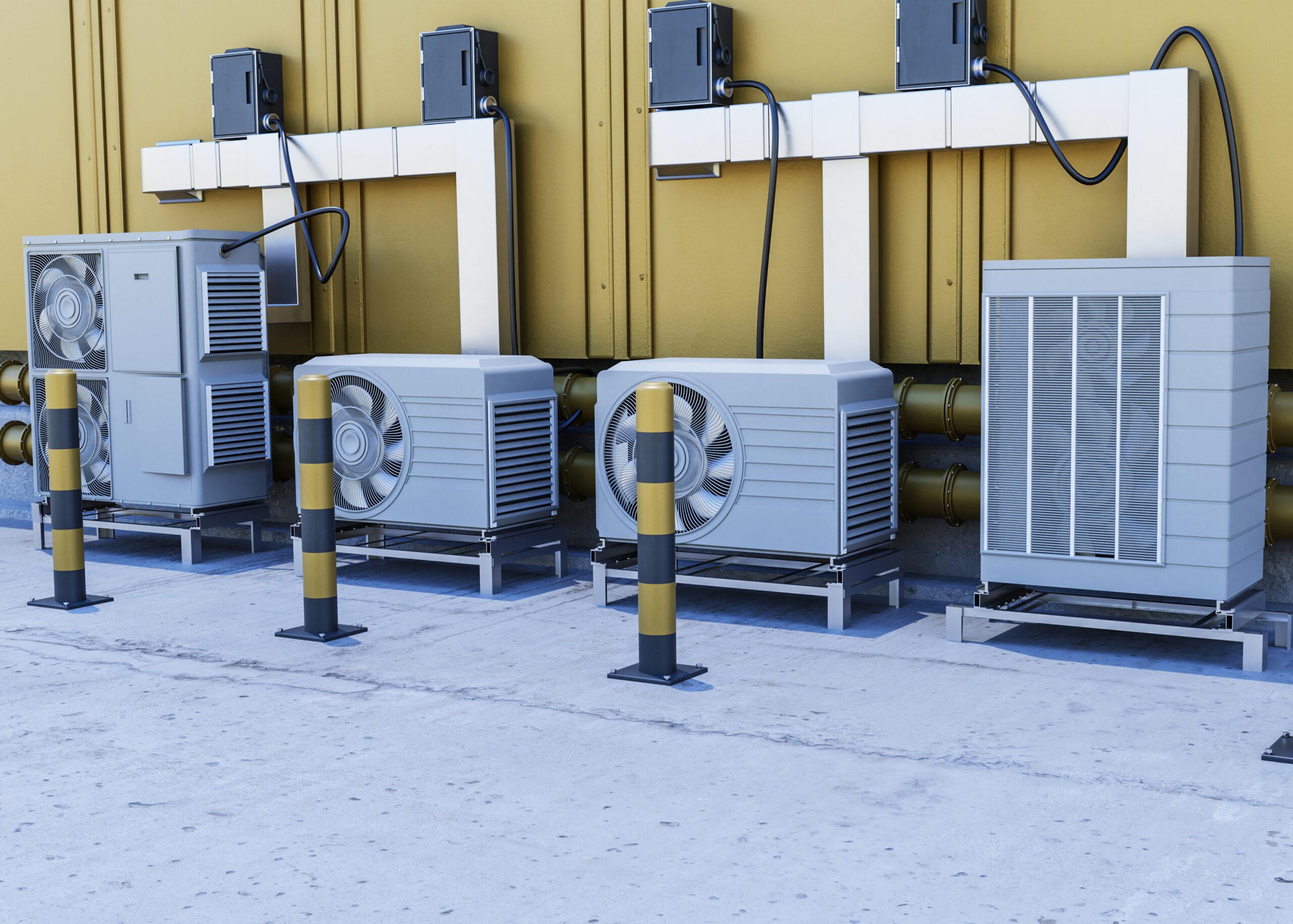DeepSYS and the Rise of Smart Cooling in KSA Commercial Buildings
Introduction
As Saudi Arabia surges ahead with its Vision 2030 plan, sustainability and digital transformation are two of the cornerstones guiding the Kingdom’s ambitious modernization agenda. Among the sectors undergoing rapid evolution is the commercial real estate and infrastructure space, where smart cooling technologies are revolutionizing the way buildings operate. At the forefront of this movement is DeepSYS, an AI-powered building management system (BMS) developed by Semantic Brains, a Saudi AI innovation firm.DeepSYS by Semantic Brains is leading the transformation of commercial buildings through AI-powered Smart Cooling in KSA
In a region where average temperatures routinely exceed 45°C in the summer months and cooling systems account for nearly 70% of electricity consumption in buildings, optimizing HVAC operations is not just a matter of cost; it’s a matter of national sustainability and energy security. DeepSYS provides an intelligent solution to these challenges by leveraging machine learning, real-time monitoring, and predictive analytics to make Saudi commercial buildings smarter, greener, and more efficient.
This article explores the growing trend of smart cooling in Saudi Arabia, the challenges faced by traditional systems, and how DeepSYS is empowering facility owners, property managers, and government projects to meet the climate and economic demands of the future.
Chapter 1: The Saudi Climate Challenge
The Harsh Reality of Cooling in the Kingdom
Saudi Arabia’s climate presents unique challenges for infrastructure. With most of the country experiencing a hot desert climate, air conditioning is an absolute necessity for comfort and productivity. Office buildings, shopping malls, hospitals, and residential complexes must rely heavily on chilled air distribution almost year-round.
This has created a situation where:
- HVAC systems account for more than two-thirds of energy consumption in buildings.
- Commercial buildings face enormous operating costs from energy usage, maintenance, and equipment replacement.
- Cooling infrastructure is often oversized and under-optimized, leading to wasted energy and unnecessary wear.
The Energy-Water Nexus
Traditional cooling systems in Saudi Arabia also place significant pressure on water resources. Evaporative cooling technologies and water-based chillers require vast amounts of water—something that’s scarce and heavily desalinated in the Kingdom. This dual challenge of energy consumption and water stress has forced policymakers and facility owners to explore alternative, intelligent solutions.
Chapter 2: The Rise of Smart Cooling
What Is Smart Cooling?
Smart cooling refers to the integration of digital technologies—AI, IoT, data analytics, and automation—into HVAC systems to optimize their performance in real time. It includes:
- Dynamic load balancing: adjusting output based on occupancy, temperature, and time of day.
- Predictive maintenance: identifying potential failures before they happen.
- Energy optimization: reducing consumption without sacrificing comfort.
- Remote control and automation: allowing facility managers to fine-tune systems centrally.
These technologies are increasingly being adopted in Saudi Arabia’s new commercial developments, data centers, smart cities, and public infrastructure.
National Drivers of Smart Cooling
Saudi Arabia’s push for smart cooling is being driven by several macro-level factors:
- Vision 2030 Mandates green infrastructure, smart city development, and energy efficiency.
- Sustainability goals: Reduce energy intensity and carbon emissions in the building sector.
- NEOM and Giga Projects: Demand the integration of advanced BMS and AI-powered energy systems.
- Economic diversification: Aims to reduce dependence on fossil fuels and subsidized energy.
In this landscape, AI-driven platforms like DeepSYS are becoming essential for achieving operational efficiency, cost control, and regulatory compliance.
Chapter 3: Introducing DeepSYS by Semantic Brains
What Is DeepSYS?
DeepSYS is an advanced AI-powered building management system (BMS) developed by Semantic Brains, a Saudi-based AI company specializing in intelligent automation across critical industries. DeepSYS acts as the intelligence layer on top of building systems, designed to control, monitor, and optimize HVAC, electricity, water usage, and maintenance operations.
Key Features of DeepSYS
- AI-Driven HVAC Optimization
DeepSYS continuously monitors internal and external temperatures, occupancy levels, and utility rates to dynamically adjust HVAC setpoints. This ensures optimal comfort with minimal energy waste. - Predictive Maintenance Engine
The system uses machine learning to detect patterns that indicate potential equipment failures, helping avoid costly unplanned downtime. - Real-Time Utility Monitoring
DeepSYS provides dashboards for electricity, water, and cooling performance. This enables facilities to track KPIs like energy intensity (kWh/m²) and spot anomalies. - Automated Fault Detection & Diagnostics (AFDD)
By identifying issues like clogged filters, refrigerant leaks, or sensor malfunctions early, DeepSYS extends equipment lifespan. - Smart Scheduling & Occupancy Learning
It learns how and when specific areas are used, adjusting ventilation and cooling schedules accordingly. - Cloud-Based Interface
Facility managers can access insights and controls via any device—ideal for large portfolios or multi-site operators.
Chapter 4: How DeepSYS Works in Practice
Use Case: Riyadh Office Tower
A 20-story office tower in Riyadh retrofitted DeepSYS to control its HVAC, lighting, and water systems. Within the first six months:
- Energy consumption dropped by 27%
- Unscheduled maintenance incidents fell by 40%
- Tenant satisfaction increased due to more stable indoor temperatures
The system detected inefficient chiller cycling during off-peak hours and adjusted the schedule. It also identified an underperforming floor-level AHU (Air Handling Unit), triggering early repair before tenant complaints.
Use Case: Smart Retail Mall in Dammam
In a newly built smart mall in Dammam, DeepSYS was integrated from the design phase. The system controls over:
- 600 variable air volume (VAV) boxes
- 45 air handling units
- 4 chillers connected to a central cooling plant
The result was an annual operational cost saving of over SAR 1.3 million, while achieving compliance with Saudi Energy Efficiency Center (SEEC) regulations.
Chapter 5: DeepSYS vs Traditional Cooling Management
| Feature | Traditional Systems | DeepSYS Smart Cooling |
|---|---|---|
| Control | Manual or fixed schedule | AI-driven adaptive optimization |
| Maintenance | Reactive (post-failure) | Predictive (pre-failure) |
| Energy Efficiency | Low-to-moderate | High (up to 30% improvement) |
| Integration | Fragmented | Unified platform for HVAC, water, energy |
| User Interface | Limited / local only | Cloud-based, mobile-friendly |
Chapter 6: Smart Cooling Across Saudi Sectors
1. Government Buildings
As public institutions adopt ESG and digital transformation strategies, DeepSYS supports:
- Real-time compliance with SEEC regulations
- Reduced operational costs across ministries, universities, and municipal buildings
2. Commercial Real Estate
Property managers use DeepSYS to reduce tenant complaints, lower utility costs, and increase building ratings (e.g., LEED certification). The platform enhances asset value and future-readiness.
3. Hospitality and Malls
Hotels and malls in Riyadh and Jeddah often have high cooling demand variability. DeepSYS allows them to adapt to daily occupancy cycles, minimizing overcooling and saving millions in energy costs.
4. Data Centers
Though not a liquid cooling system itself, DeepSYS plays a vital role in integrating with cooling infrastructure used in data centers, helping balance load, track energy efficiency, and forecast equipment wear.
Chapter 7: The Road Ahead
Integration with District Cooling
District cooling is becoming common in mega-projects like NEOM, The Red Sea Project, and Qiddiya. These systems are controlled via SCADA/BMS platforms. DeepSYS can serve as the AI optimization layer atop these frameworks, providing granular insight and localized control.
Carbon Footprint Reduction
With the rise of carbon reporting requirements in Saudi Arabia, DeepSYS supports automatic GHG accounting for Scope 1 and Scope 2 emissions related to cooling, water, and power systems.
Smart City Enablement
As Saudi Arabia develops cognitive cities and smart infrastructure, DeepSYS will be critical in:
- Enabling self-regulating public buildings
- Integrating with IoT sensors and 5G networks
- Creating energy-efficient urban districts
FAQs
Q1: Can DeepSYS be integrated into existing buildings?
Yes, DeepSYS is designed for both retrofits and new developments. Its modular architecture supports integration with legacy BMS, sensors, and meters.
Q2: Does DeepSYS require internet connectivity?
While cloud access enhances remote control and analytics, local on-premise versions of DeepSYS can also function independently.
Q3: Is DeepSYS compliant with Saudi energy regulations?
Yes, it is designed to support compliance with SEEC guidelines, energy labeling standards, and Vision 2030 goals for sustainability.
Q4: What kind of savings can I expect?
On average, buildings using DeepSYS report 15–30% energy savings, with ROI achieved in less than 18 months.
Q5: Is DeepSYS only for large buildings?
While best suited for mid-to-large-scale facilities, DeepSYS can be tailored for smaller offices, hospitals, or schools, depending on the needs.
Conclusion: Smart Cooling Is Saudi Arabia’s Future
The era of reactive, energy-guzzling cooling systems is coming to an end. As Saudi Arabia accelerates its path to a digitally empowered, resource-efficient economy, solutions like DeepSYS will become standard across the commercial infrastructure landscape.
By combining AI, predictive analytics, and real-time monitoring, DeepSYS not only delivers measurable operational benefits but also aligns with Vision 2030’s pillars of innovation, sustainability, and smart living.
For property developers, government agencies, and corporate real estate owners, investing in intelligent cooling systems like DeepSYS is not just a technological upgrade—it is a strategic imperative for future resilience and competitiveness.


